50 days since the first earthquake hit Nepal, relief efforts are slowing down due to donor fatigue and tough regulations by the government. In the post disaster scenario, people in many parts of Nepal are still sleeping under the open sky.
Figures by international agencies place the death toll at around 8500 and close to 18,000 people have been reported injured. One fifth of the population has been directly affected.
Roughly 150 kilometers away from Kathmandu and closer to the epicentre, many pockets in Nuvakot District have faced 100% damage. People complain that they have not seen anyone from the government except engineers who hung signs that mark buildings 'unsafe'. While the worst hit areas of Sindhupalchowk and Gurkha have been the prime concern of government and nongovernmental relief organisation, the district of Nuvakot has been largely ignored.
![2015-06-11-1434001899-3200168-1.jpg]()
A young girl runs past her destroyed house in Gangdada village, Nuvakot district, Nepal. 150 kilometres from the capital Kathmandu and closer to the epicentre, the destruction in this area of Nuvakot is close to 100%.
![2015-06-11-1434002054-9738253-2.jpg]()
Villagers in Gangdada village take refuge under a tree. More than a month since the first earthquake shook Nepal, many here still don't have a place to stay.
![2015-06-11-1434002072-9167054-3.jpg]()
Anma mai, 80, from the Buddhist Tamang community takes shelter in a neighbour's house which was fixed by the locals. Anma who lost three members of her family is the only survivor.
![2015-06-11-1434002198-5148827-4.jpg]()
A group of young boys from the Tamang community play a game called 'pott' while taking shelter in the only house that was left standing in their community.
![2015-06-11-1434002240-5728848-5.jpg]()
Ramesh Giri stands in front of the school that was destroyed in the earthquake. He lost his daughter who studied in the same school.
![2015-06-11-1434002331-6984361-6.jpg]()
Children stand outside a school in Haldekalika marked 'Unsafe' by the government.
![2015-06-11-1434002428-7910069-7.jpg]()
Three children from the school died in the earthquake.
![2015-06-11-1434002934-9123920-8.jpg]()
Remains of a government school in the Haldekalika VDC in Nuvakot.
![2015-06-11-1434003076-5830508-10.jpg]()
Ram Bahadur, 40, stands in front of his house in the remote area of Nuvakot. His house was partially destroyed in the earthquake that hit Nepal on April 25.
![2015-06-11-1434003134-5870730-11.jpg]()
Ram Bhadur's house lies in the middle of a crevasse that developed in the earth due to the earthquake and runs past his field and through his house. "Even a small aftershock or rain can cause a landslide here, it is unsafe for us to live here," Bahadur says.
![2015-06-11-1434003053-7142753-9.jpg]()
Villagers collect relief outside Shri Ganesh School in the Haldekalika VDC in Nuvakot. Many schools have been turned into makeshift relief camps by local volunteers and relief organisations.
![2015-06-11-1434003205-4766415-12.jpg]()
Traffic is halted while government officials clean the road which connects Nuvakot to Kathmandu. Landslides have been common because of continuous aftershocks and rains in Nuvakot which lies in the surrounding hills of Kathmandu valley.
![]() Like Us On Facebook |
Like Us On Facebook |
![]() Follow Us On Twitter |
Follow Us On Twitter |
![]() Contact HuffPost India
Contact HuffPost India
Figures by international agencies place the death toll at around 8500 and close to 18,000 people have been reported injured. One fifth of the population has been directly affected.
Roughly 150 kilometers away from Kathmandu and closer to the epicentre, many pockets in Nuvakot District have faced 100% damage. People complain that they have not seen anyone from the government except engineers who hung signs that mark buildings 'unsafe'. While the worst hit areas of Sindhupalchowk and Gurkha have been the prime concern of government and nongovernmental relief organisation, the district of Nuvakot has been largely ignored.
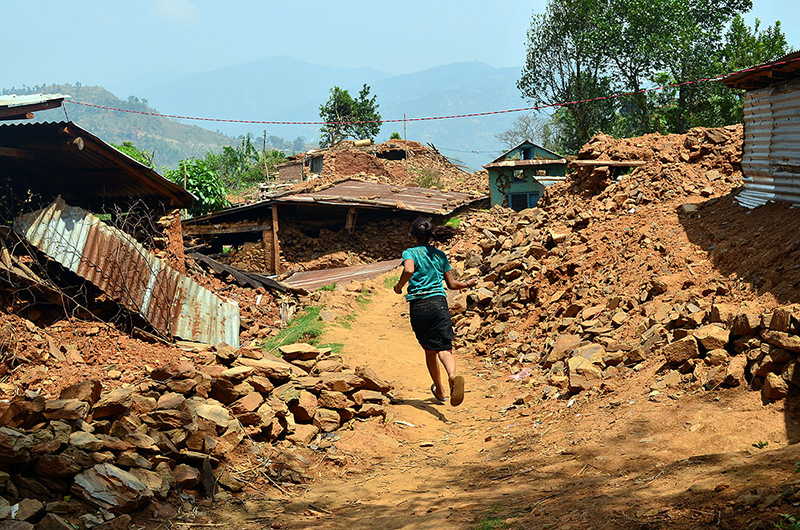
A young girl runs past her destroyed house in Gangdada village, Nuvakot district, Nepal. 150 kilometres from the capital Kathmandu and closer to the epicentre, the destruction in this area of Nuvakot is close to 100%.
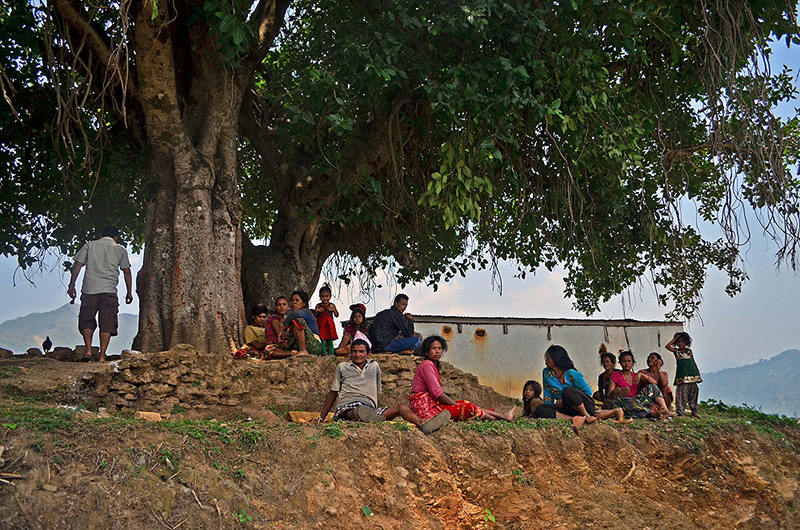
Villagers in Gangdada village take refuge under a tree. More than a month since the first earthquake shook Nepal, many here still don't have a place to stay.
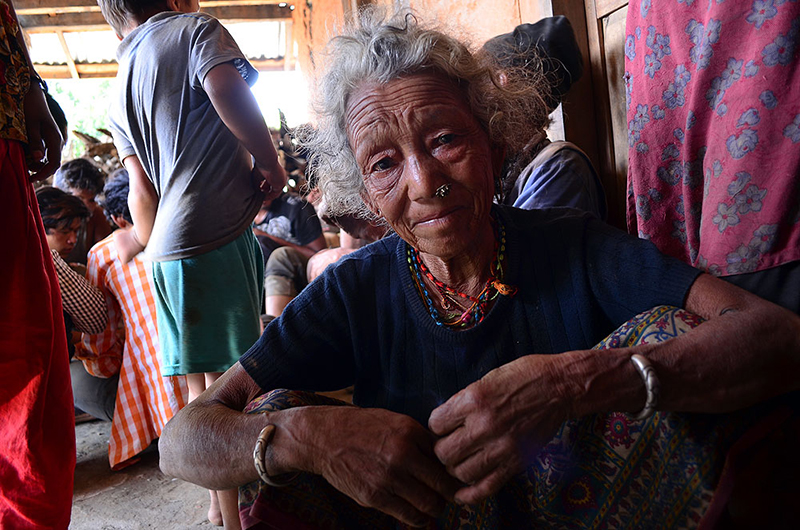
Anma mai, 80, from the Buddhist Tamang community takes shelter in a neighbour's house which was fixed by the locals. Anma who lost three members of her family is the only survivor.
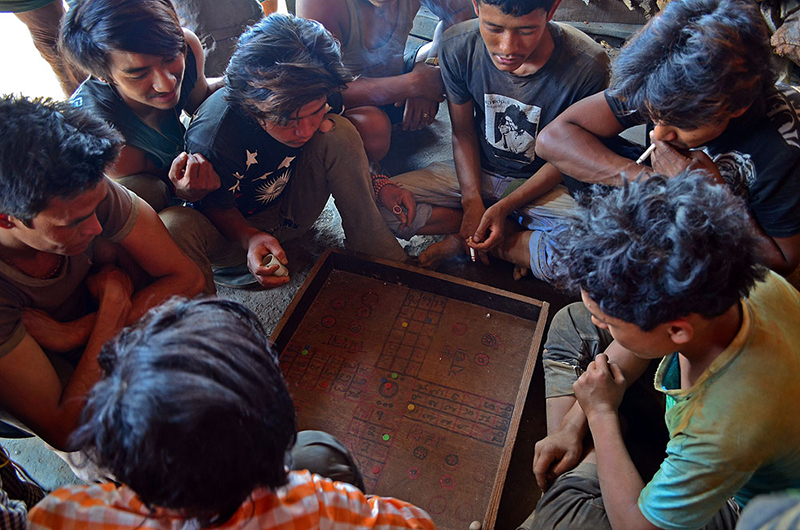
A group of young boys from the Tamang community play a game called 'pott' while taking shelter in the only house that was left standing in their community.
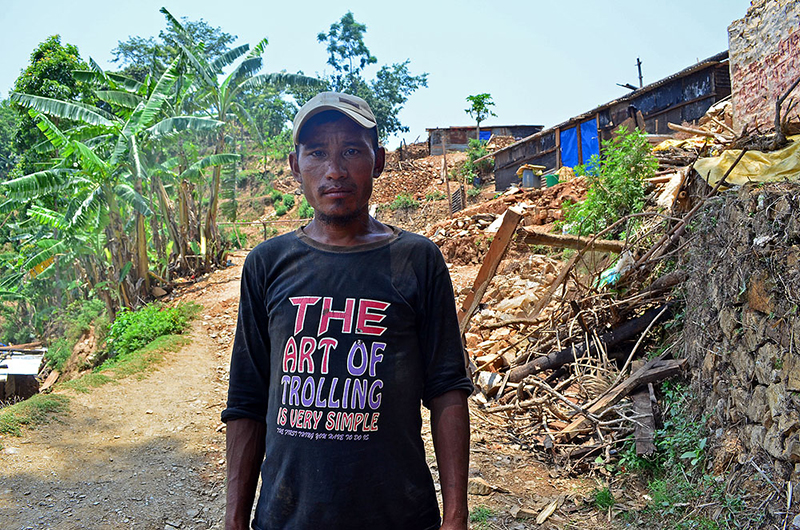
Ramesh Giri stands in front of the school that was destroyed in the earthquake. He lost his daughter who studied in the same school.
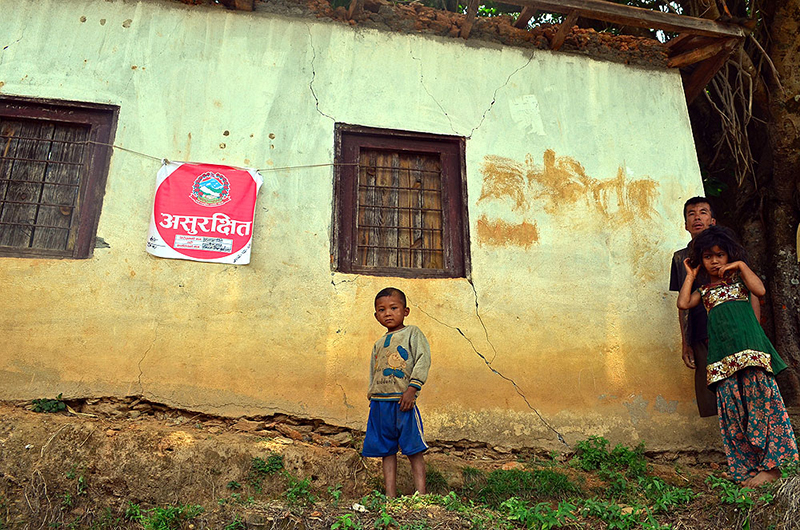
Children stand outside a school in Haldekalika marked 'Unsafe' by the government.
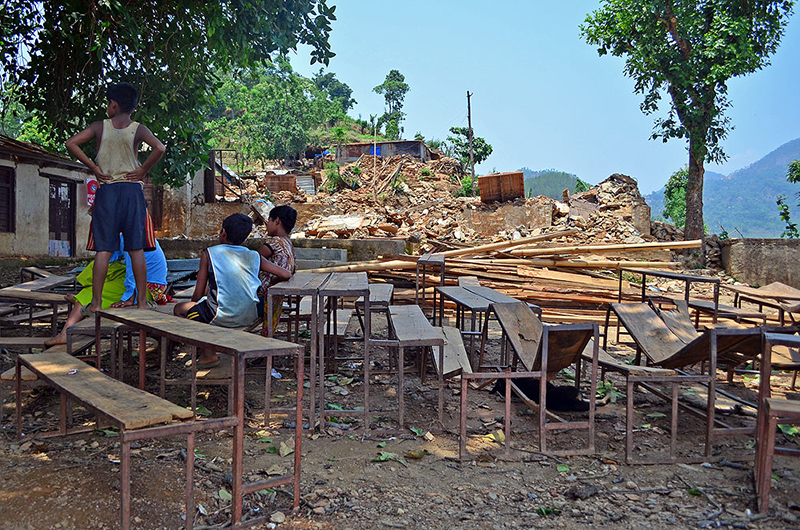
Three children from the school died in the earthquake.
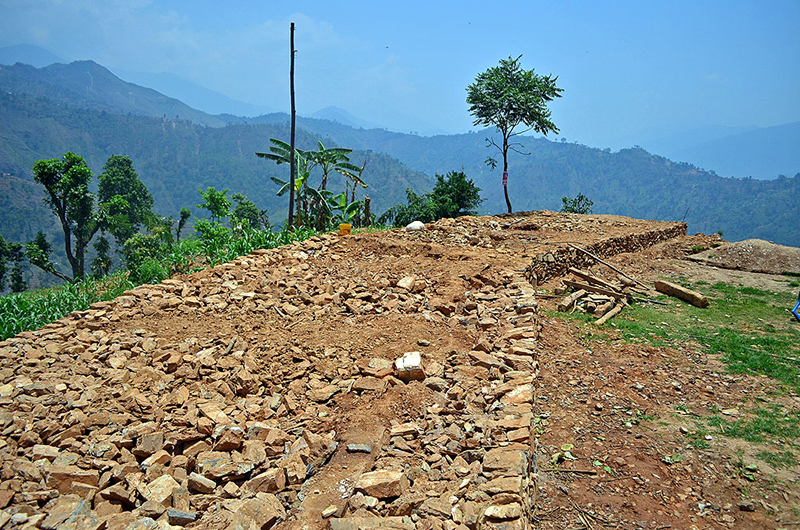
Remains of a government school in the Haldekalika VDC in Nuvakot.
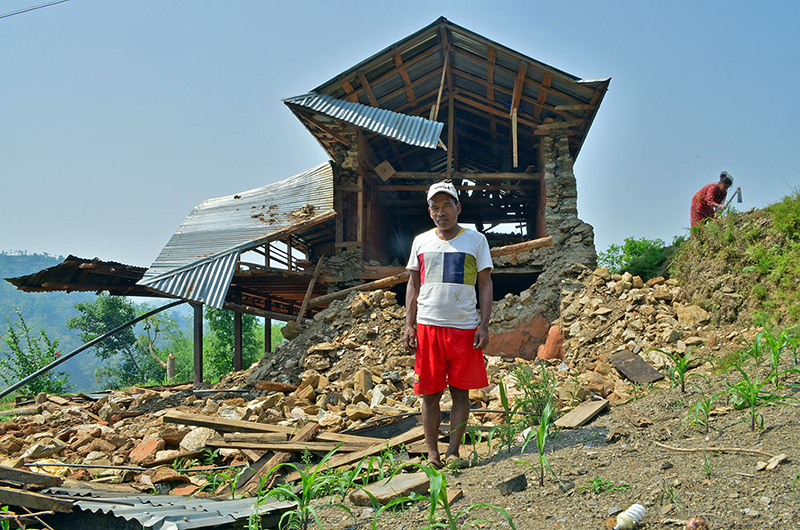
Ram Bahadur, 40, stands in front of his house in the remote area of Nuvakot. His house was partially destroyed in the earthquake that hit Nepal on April 25.
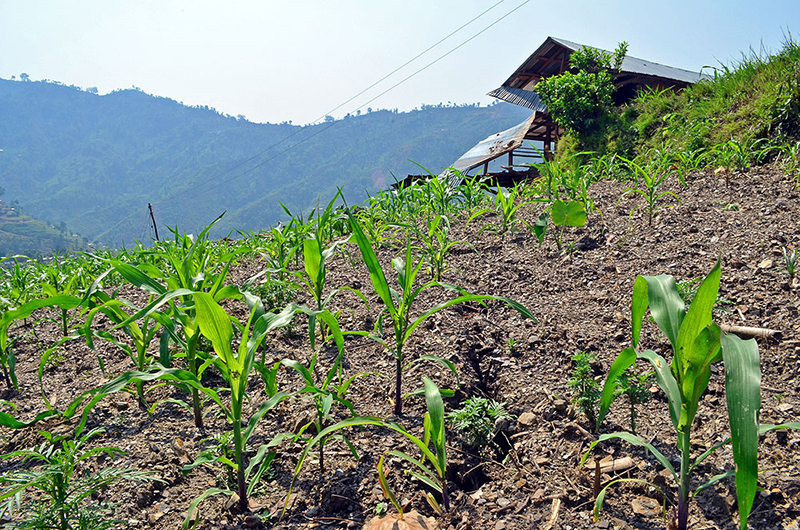
Ram Bhadur's house lies in the middle of a crevasse that developed in the earth due to the earthquake and runs past his field and through his house. "Even a small aftershock or rain can cause a landslide here, it is unsafe for us to live here," Bahadur says.
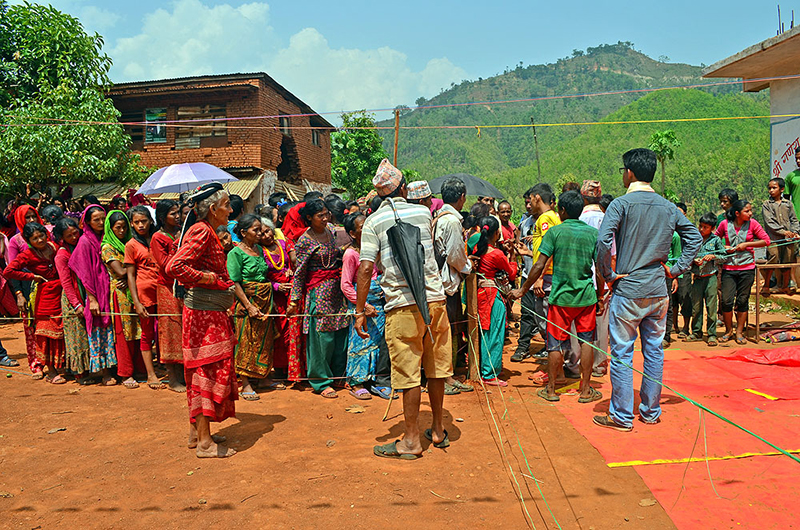
Villagers collect relief outside Shri Ganesh School in the Haldekalika VDC in Nuvakot. Many schools have been turned into makeshift relief camps by local volunteers and relief organisations.
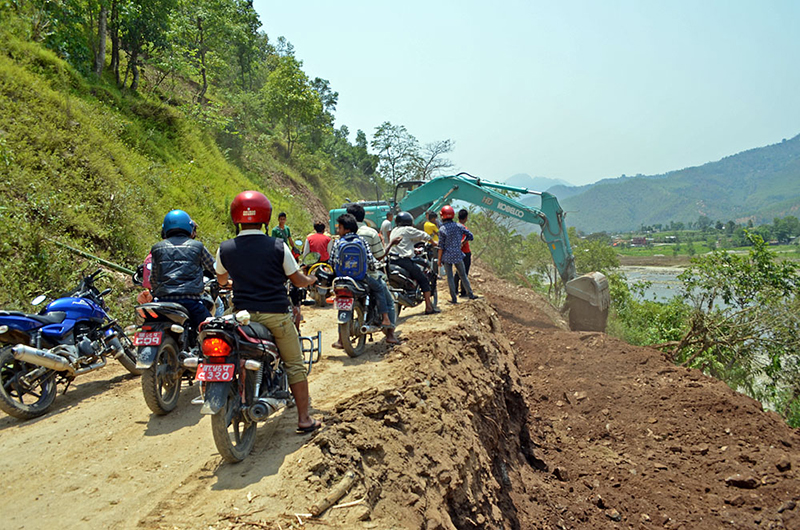
Traffic is halted while government officials clean the road which connects Nuvakot to Kathmandu. Landslides have been common because of continuous aftershocks and rains in Nuvakot which lies in the surrounding hills of Kathmandu valley.
 Like Us On Facebook |
Like Us On Facebook |  Follow Us On Twitter |
Follow Us On Twitter |